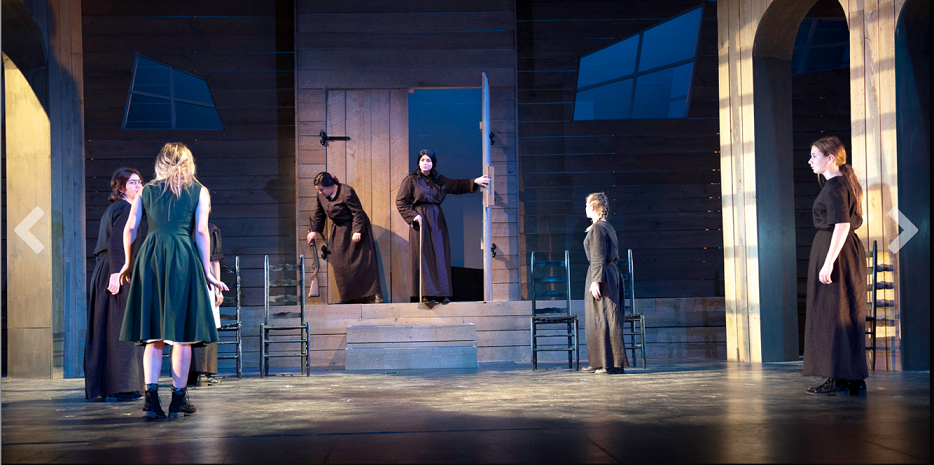Review of The House of Bernarda Alba
Once again, the Advanced Theatre Ensemble leaves us in awe.
February 8, 2017
Last semester, Berkeley’s Advanced Theatre Ensemble (ATE) performance of You Can’t Take It With You captivated Berkeley’s audience and left a few, like myself, wondering what else was in store.
This semester’s production of “The House of Bernarda Alba” was no different. To describe ATE’s winter production in one word — captivating. “The House of Bernarda Alba,” written by poet Federico García Lorca in the 1930s, mimicked the style of magical realism. Christopher Marshall, the director of Berkeley’s production, describes the play as “a play about women and the oppression of women. [The overall tone is] dark. You can feel the oppression.” Certain phrases like “because men help each other cover up things like that and no one’s able to tell on them” hint at a deeper message of gender inequality that existed at the time. Each of the names had a specific meaning in Spanish. Angustias, the eldest and ugliest of the daughters, had a name meaning physical or mental anguish. Actions like the spilling of salt were omens of bad luck and death. Even the house itself held a deeper poetic meaning, representing the oppression of women during the Spanish Civil War. All of these components combined made watching the play a very analytical and interesting experience.
The beautifully built set cast a spell on me. I was enchanted by the large arches of doorways and the great gaps between wooden planks. Contributing to Lorca’s sense of magical realism, blue and purple light reached through the cracks to infuse the characters with a dark power. The windows were crooked and asymmetrical to accentuate the unsettling mood. Set designer Chris Cook said building the set had been “fun, but difficult… it’s really awesome when we can create something in a space like this and add so much beauty to something that [the actors] worked so hard to create.”

STRICT RULE: Alexa Rudolph ‘17’s demanding stage presence sent a chill through the audience’s bones. All entrances made by the tyrant left the other characters frozen and speechless. The iron fist of Bernarda set the conflict as well as the intense oppressive mood.
The lighting was dark with a soft glow to it, almost eerie, which kept the audience in a state of suspense. The sound, a soft rumbling noise in the background, submerged me into the world of Bernarda and her daughters. Yet the horror story set contradicted the energy of the two opening actresses. As the two maids bantered, their vagueness set the stage perfectly for the immensely intriguing story to later reveal itself to the audience.
La Poncia, played by Mira Rajani ’17, stood out because she didn’t hesitate to speak her mind and had a beautiful stage presence, directing eyes and ears towards her as she spoke. Every word Rajani dictated came to life. Her character brought a certain relatableness to the odd and confusing story. Bernarda, played by Alexa Rudolph ’17, was another character who made an impression. Rudolph took the stage prominently, displaying her power and influence over the rest of the characters with strong commands and raw emotion. Bernarda was a complex character and Rudolph said, “If you know me, I’m not a very loud person… intentionally. I’m not necessarily soft spoken but I don’t get mad easily. Being Bernarda was definitely a huge challenge because she’s such a tyrant and is horrible to her daughters. She has no friends and tries to very hard to be in charge of everything. But, it’s hard for her to do that because of her concern for what others think of her.” Rudolph played Bernarda’s tactics of enforcement and guilt flawlessly, bringing her complex yet understandable character to life.
My favorite things about the play were the silences. Scenes would speed up and confuse the audience, only to break to an abrupt and heavy silence. The noise of the wordless cast a certain spell over the packed room of viewers — you could hear a pin drop. The silences were the glue to the entire play and the direction was done perfectly as to draw the watcher back in, even when completely lost in the chaos.

SETTING THE STAGE: The set staged the scenes perfectly. Large, reinforced doors in the back stood for the strong oppression inflicted by Bernarda. The angled windows on the back walls were made disproportionate as to enhance the essence of wrongness in the house. The large cracks between all the boards captured the influence that the outside world had on their home and the lives of all who resided in it.
The plot itself was at times hard to follow. There was much left unspoken between characters, but the tension was a constant. The intense levels of competitiveness in all characters led to a heightened sense of conflict, escalating the intensity of the drama. Watching, my emotions varied from shocked to amused to sad and worrisome. The actresses did a fantastic job of making me sympathetic to the unfortunate lives of all who resided in the Alba house.
Walking out of the production, I heard countless whispers as everyone tried to piece together what had happened. Overall, the production was a success and the hard work put into it by the many contributors seemed to have paid off. The actresses asked to give a shout out to McKenna Ebert ’18, the stage manager. They said they couldn’t have pulled the show off without her. And to Mr. Cook, I’d like to say that your table looked fantastic. Bravo!



